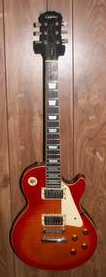Epiphone Electric Guitars...
More Problems, More Change
Epiphone electric guitars flourished during the period from 1961 to 1965. However, the rise of
foreign made guitars caught the entire US industry off guard. By 1969 these cheap instruments, often based on
US designs, had closed the doors of many US manufacturers and had taken around 40% of the Epiphone/Gibson market
share.
Things Worsen...
Even more problems reared their heads. Ted McCarty, Gibson's general manager, had stepped down and quality was perceived to had dropped. In addition, union problems again entered the equation. Gibson's parent company, CMI, weakened by the problems had been purchased in 1969 by the Ecuadorian ECL company, a beer company, of all things. This left Epiphone in a precarious position. It was perceived to be secondary to Gibson but still too expensive to compete with foreign imports.

By 1976 things had improved when the Epiphone electric guitar line was bolstered by the introduction of models such as the Monticello, a scroll-bodied electric, and the Presentation line of flattops. In addition, the introduction of the Nova, a flattop series, and three new solid-bodies named Genesis were introduced. By 1979, the Epiphone product line was gaining speed.
More Changes, Another Move...
Epiphone's Far Eastern operation seemed to be finding its footing but more upheaval was on the way. The rise of the electronic
keyboard was eating into the electric guitar market and rising prices of Japanese production prompted a move to Korea and a collaboration with
the Samick company. In addition, three Harvard MBAs - Henry Jusckiewicz, David Berryman and Gary Zebrowski - bought Gibson from ECL. Their
main priority was reviving Gibson and it seemed that Epiphone was in danger of being swept under the rug and forgotten.

However, Epiphone still had work to do.
30 Day FREE TRIAL!








New! Comments
Have your say about what you just read! Leave me a comment in the box below.